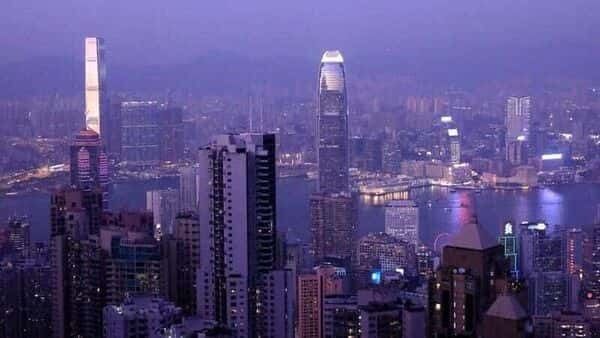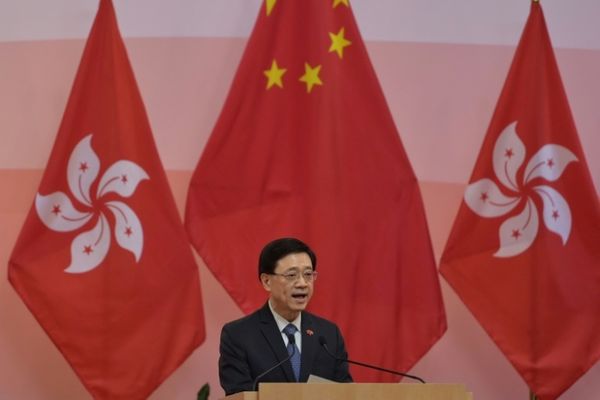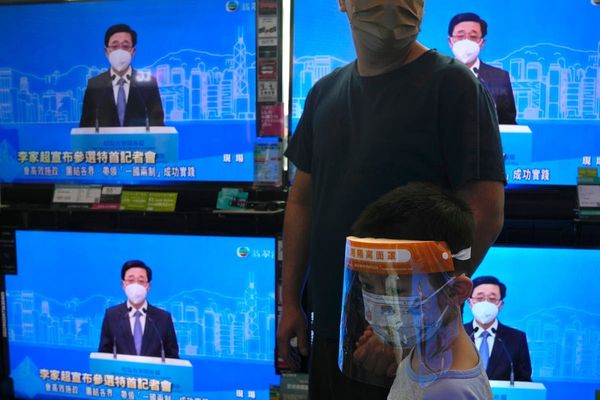
Few places have inspired more tropes and clichés than Hong Kong. A bridge between East and West. A gateway to China—or China’s to the world. “They strike a gong and fire off a mid-day gun,” one 1960s travel promo for the city declared.
Buried under the often appalling Orientalism with which these qualities were frequently presented were some truths. A Chinese city influenced by more than 150 years of British rule, Hong Kong had deftly, if not perfectly, served as a conduit for money, goods, and people moving between mainland China and the rest of the world. If the crackdown on the city in recent years dimmed the hopes of those who wanted to see this continue, these hopes have now all but been extinguished. The damage inflicted on Hong Kong by Beijing and its loyalists, and the consequences they have wrought, has made it clear that the city’s balancing act won’t be revived.
In the past few days, two prominent British judges who had been serving on Hong Kong’s highest court stepped down, a move that came in tandem with the U.K. government stating that the city had reached a “tipping point” where it was no longer tenable for the judges to serve. The United States government has also issued its own damning assessment of Hong Kong’s pivot toward mainland-style authoritarian rule. The exodus of Hong Kongers and foreign city residents has reached such a level that even the city’s chief executive, who announced this week that she will not seek a second term, admits that Hong Kong is experiencing a brain drain. Her replacement will almost certainly be a former police officer who has been saddled with U.S. sanctions and who helped trigger the 2019 protests. His elevation would cement that, above all else, the authorities in Beijing view the issue of security as paramount, even at the cost of business interests, rapidly decreasing civil liberties, and professional accountability.
If Hong Kong is to be thought of as a bridge linking East and West, Steve Tsang, the director of the China Institute at London’s School of Oriental and African Studies, said the infrastructure still exists, but the obstacles erected by Beijing have now rendered it a tough passage. “A bridge can be there, and people can use it and cross and mix and interact and benefit each other,” he told me. “Or a bridge can be there with barricades being put up by one side, and with people on one side not being allowed to use the bridge … I think that is what we are looking at in Hong Kong.”
Of all of the recent shifts, the one with the greatest symbolic impact has been the judges’ resignation. A quarter century after its handover from Britain to China, Hong Kong retains many of the qualities and quirks of British courtrooms, and that is by design. The 1984 treaty between Beijing and London that laid out the conditions for Hong Kong’s return to China included a provision, later written into the city’s mini constitution, that allowed for foreign judges drawn from “common law” jurisdictions to serve in Hong Kong to help maintain the judicial system’s stature after the handover. The courtroom costumes of perukes and barrister robes also remained.
In this way, Hong Kong is unique, according to Stuart Hargreaves, a law professor at the Chinese University of Hong Kong who has written extensively about the practice. Other states that use imported judges on appellate courts are generally tiny, impoverished, and in need of judicial expertise, such as Kiribati and Papua New Guinea. Others, such as Bosnia and Herzegovina, are in post-conflict scenarios where a process of reconciliation is being carried out.
Over the years, Hargreaves notes, the number of opinions penned by foreign judges in Hong Kong’s Court of Final Appeal on substantive matters has declined. However, these judges continued to hold symbolic value, a view shared by the Hong Kong judges who have worked alongside their foreign counterparts. Speaking in 2016, Joseph Fok, a Hong Kong judge on the Court of Final Appeal, said that the presence of the foreign judges provided “an external affirmation of real value about the independence of the court and the Hong Kong judiciary.” Fok continued: “There is also what may, in crude terms, be described as the allied ‘canary in the coalmine’ phenomenon.”
Two of these canaries died figurative deaths last week. Lord Robert Reed, the president of the U.K.’s Supreme Court, and Lord Patrick Hodge, the deputy president, stepped down from their positions on the Court of Final Appeal. “I have concluded,” Reed wrote in explaining the decision, “in agreement with the government, that the judges of the Supreme Court cannot continue to sit in Hong Kong without appearing to endorse an administration which has departed from values of political freedom, and freedom of expression, to which the Justices of the Supreme Court are deeply committed.” British Foreign Secretary Liz Truss welcomed the move, saying that there had been “a systematic erosion of liberty and democracy in Hong Kong” since the imposition of a national-security law by Beijing two years ago. The continued participation of the judges would, she said, “risk legitimizing oppression.” (Nine other foreign judges, drawn from the U.K., Canada, and Australia, decided against resigning. They are retired in their home countries, unlike the two British judges who did step down.)
When I asked Lin Feng, the associate dean at City University of Hong Kong’s School of Law, who previously wrote that the foreign judges “bear the greatest symbolic value of Hong Kong’s preservation of the rule of law and judicial independence,” about the developments, he told me that he had “no doubt” that there would be “some negative impacts upon the image of the Hong Kong judiciary.” Had they all withdrawn, the implications would have been “enormous,” he said. “I couldn’t imagine what would happen if all the overseas nonpermanent judges were to resign.”
This symbolic value is best measured by the fury that Hong Kong leaders expressed in reaction. Chief Executive Carrie Lam said the judges were “put under political pressure, and that is a kind of political manipulation.” Her predecessor, C. Y. Leung, who posts on Facebook with the frequency of a disgruntled uncle best avoided at holiday gatherings, called the resignations “a stain on the independence of the British judiciary that cannot be cleansed,” adding that they had made Britain a “laughing stock.”
The consternation and anger reveal the dilemma facing Hong Kong’s new political regime, placed in power through overhauled sham elections, unchallenged by opposition, and whose fitness for office is judged by a contorted metric that has confused patriotism with blind nationalism. The city’s government and lawmakers, casting themselves always as the victim, seldom let pass a chance to denounce and belittle the West, a nebulous collection of perceived evil forces blamed for many of Hong Kong’s self-inflicted problems. Yet these same officials pine to be accepted, respected, and welcomed as they were just a few years ago by their Western counterparts.
“That is what makes Hong Kong tick,” a former pro-Beijing lawmaker, who asked not to be named, because of political sensitivities, told me recently. “It is the cushion between two conflicting worlds: the East and the West.” That cushion has begun to disappear. Look around, he told me from his office; the “infiltration” of Hong Kong that is under way is not by any foreign forces but by Beijing, via its representatives in the city.
The day following the judges’ decision, the U.S. piled on with its own critique of Hong Kong’s government after its total mishandling of a COVID wave. In a yearly report, the State Department wrote that the national-security law had “eliminated the ability of Hong Kong’s pro-democracy opposition to play a meaningful role in the city’s governance and effectively criminalized peaceful political expression critical of the central and local governments.” According to the report, the number of Americans estimated to be living in Hong Kong had dropped by about a fifth over the past year, to about 70,000, an eye-catching decline. Along similar lines, a survey by the European Chamber of Commerce in Hong Kong found that nearly 50 percent of European firms plan to fully or partially relocate operations and staff outside the city. The exodus is bottoming out the used-car market in Hong Kong and driving a boom in pet-relocation services. At a visit to a doctor’s office last month, the first question I was asked wasn’t about my latest checkup but when I was planning on leaving.
A partner at a U.S. law firm who is preparing to exit for good with his family told me it was the gradual erosion of many freedoms, rather than the complete destruction of one in particular, that had pushed him to depart. Defenders of Hong Kong’s current course, he said, are quick to remind people that it is still freer than the mainland. He didn’t doubt this fact, but, speaking on the condition of anonymity because his law firm’s clients include Chinese-state-owned enterprises, he summed up his thinking: “People look at a house,” he said, “and if all the pillars are crumbling a little bit, you want to dodge and run.”










